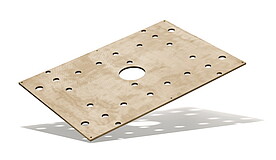
With the FRATHERNIT AN and FRATHERNIT DN variants, we offer materials that are capable of meeting the typical requirements of industry in their respective applications:
High thermal compressive strength
High temperature stability
Very low heat conductivity
Chemical resistance
For other applications, there are special solutions offering a range of properties that are indispensable in specific applications.
| Application temperature (°C) |
Thermal conductivity (W/mK) |
Compressive strength (N/mm2) |
Flexural strength (N/mm2) |
Thermal expansion coefficient (10-61/K) |
||||
| Permanent | Short term | at 23°C | at 200°C | at 250°C | at 23°C | |||
| FRATHERNIT® DN | 200 | 210 | 0.18 | 330 | 120 | _ | 140 | 18 |
| FRATHERNIT® AN | 200 | 210 | 0.19 | 600 | 350 | - | 380 | 13 |
| FRATHERNIT® 4000 | 200 | 230 | 0.13 | 300 | 100 | - | 200 | 20 |
| FRATHERNIT® AE3 | 250 | 260 | 0.21 | 570 | - | 360 | 425 | 19 |
| FRATHERNIT® AE4 | 250 | 300 | 0.23 | 625 | 390 | 340 | 430 | 19 |
| FRATHERNIT® AS | 270 | 280 | 0.25 | 400 | 260 | 200 | 120 | 16 |
| FRATHERNIT® 2000 B | 200 | 210 | 0.12 | 300 | 110 | - | 130 | 18 |
| FRATHERNIT® SG | 500 | 600 | 0.26 | 400 | - | 250 | 200 | 10 |
The values listed were determined on standard test specimens. The material properties may deviate from these values depending on the applications and component geometry. Please contact us for precise clarification of the material suitability. Other technical data on request. Subject to technical modifications and errors. 2014 edition.


